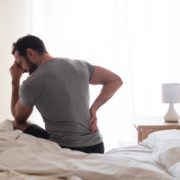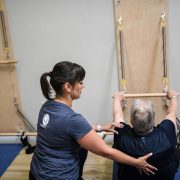Tips to Fix Morning Back Pain
Morning Back Pain? Things you can do.
One of the most common complaints from chronic back pain sufferers is back pain first thing in the morning.
For some folks it rears its ugly head on occasion and appears out of nowhere – as if they’ve thrown their back out. For others it’s like ground-hog-day – they go to bed feeling great but wake up every morning feeling stiff and achy.
Why does this happen? Shouldn’t your back feel better after a good night’s sleep?
Back pain impacts people in different ways. Both the location of your pain as well as the time of day you feel your worst can be indicators of where your back pain is coming from and what’s going on.
Some of the most common causes of morning back pain include:
- Poor sleeping position
- A crappy mattress
- Bulging discs
Let’s go through each one and talk about tips to help morning back pain.
1. Poor sleeping position
The sleeping position that aggravates you is going to depend on the underlying cause of your back pain. Sometimes sleeping on your back with legs elevated is what makes your back feel worse in the morning – even if it feels amazing while you’re in this position. For others, sleeping on their stomach is the thing that wreaks havoc on their spine.
The most back-friendly position is to sleep on your side. Side-sleeping allows you to put your spine in a neutral position – which is where you get in the least amount of trouble.
It’s really challenging to achieve a neutral spine when you’re on your back or stomach. If it bothers your hips or shoulders to sleep on your side – I recommend placing a pillow under your waist as well as your head – and if needed – also one between your thighs.
2. A Crappy Mattress
Over the course of my career, I’ve probably been asked at least 1000 times what the best mattress is to sleep on. The answer is “it depends”. Your most important concern should be to find a mattress that you feel comfortable on and that gives you the best night’s sleep. This is different for everyone. Some prefer soft and plush, while others prefer firm and supportive.
But here’s the thing – if you don’t have an underlying back problem then the surface you sleep on will be irrelevant. In most cases, I find that when a mattress aggravates your back, it’s a sign that you’ve got a back problem brewing that needs some attention.
That being said – for those that do suffer from generalized, chronic back pain – a firmer, more supportive mattress is going to be your best bet.
3. Bulging Discs
This is the most common reason I see for morning back pain.
Your vertebral disc has three primary functions:
- Absorb shock
- Help hold the vertebrae of your spine together
- Contribute to the mobility in your spine
The interesting thing about vertebral discs is that they are made up primarily of water.
Over the course of a normal day – and over the course of life – your discs will compress and decrease their water content. At night, your disc literally re-hydrates and can gain up to 17-25 mm of height. While this may be beneficial to someone who’s arthritis is to blame for their back pain, it is not beneficial for someone suffering from a bulging disc.
Remember when I mentioned that your disc is partially responsible for mobility in your spine? When you have a building disc – that bulge restricts your mobility. If it fills up with fluid overnight – you’re going to wake up feeling a lot more restricted and in a lot more pain.
Unfortunately, there is no quick fix I can reveal for you on this one. The best advice I can give you is that if you’re waking up every morning in a lot of pain and you’re afraid to move – there’s a good chance you’re suffering from bulging discs, and you should see someone who can help you with this.
If you’re waking up every morning with back pain…
then hopefully this information helps you have a better understanding as to why it might be happening. Although a crappy mattress could be the reason, I caution you not to default to that. More often than not, there’s an underlying problem in your back that needs to be addressed.
But the good news is that 80% of the time there is a natural, movement-based solution that can address your back pain successfully without relying on pills or procedures.
Are you experiencing back pain and looking to get help without pills or procedures?
Request to talk to one of my specialists to see if we would be the right fit to help you get out of pain. CLICK HERE to request a Free Discovery with one of my specialists.
Dr. Carrie Jose, Physical Therapist and Pilates expert, owns CJ Physical Therapy & Pilates in Portsmouth, NH. To get a free copy of her Guide to Easing Back Pain and Stiffness – click here.



